Russian air defense systems manufacturer Almaz Antei hopes to complete testing of its new Poliment-Redut ship-based air defense missile system by the end of this year, the company’s General Director Vladislav Menshikov said on Saturday.
Previous Russian media reports have claimed the development of the system has been delayed.
Poliment-Redut is derived from the land-based Vityaz air defense system which uses the 9M96 medium-range air defense missile.
“Work on the system is at a preliminary test stage. But to complete testing we need a ship at sea,” Menshikov said. “This year, by all estimates, testing should be complete. The missiles are ready, we are waiting to go to sea,” Menshikov said in an interview with Vedomosti newspaper published on Saturday.
Almaz Antei is also working on new radars and missiles for its future land-based S-500 air defense system, he said.
Russia is continuing to develop its “promising” airborne defense laser program, Menshikov said.
“The Americans have not managed to achieve the planned results [in their airborne laser projects], although the technology… is still being used in other developments,” he said.
“Similar research work is under way in Russia, and we consider it quite promising,” he said.
The United States began developing airborne defense lasers designed to destroy enemy nuclear intercontinental ballistic missiles in the mid-1990s. In a successful February 2010 test, a multi-megawatt-class chemical oxygen iodine laser installed in a Boeing 747-400F aircraft destroyed a ballistic missile and other targets.
However, the project, which would eventually cost $5 billion, was reportedly shelved because of mounting costs and doubts about its actual practical value.
Nevertheless, Pentagon officials have said the technology would be used to develop other laser defense systems, to be mounted on high altitude drones.










